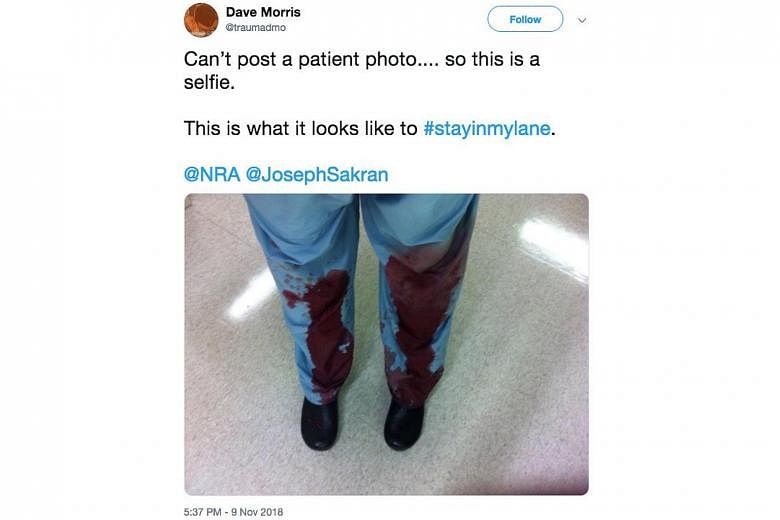WASHINGTON - America's long-running debate over gun control flared up with a renewed vigour this week as doctors, responding to a rebuke by the pro-gun National Rifle Association to stay out of gun politics, pushed back on social and mainstream media with harrowing, bloody tales of their everyday efforts to save victims of firearms violence.
The NRA sparked the firestorm on Nov 8 when it responded to updated recommendations from the American College of Physicians on reducing gun deaths and injuries, writing on Twitter: "Someone should tell self-important anti-gun doctors to stay in their lane."
Outraged doctors quickly united under the hashtag #ThisISOurLane, with impassioned tweets recounting their despair at having to inform weeping mothers of their children's death, photos of blood-soaked operating theatres, and graphic descriptions of bullets tearing through a body.
"Do you have any idea how many bullets I pull out of corpses weekly?" wrote California forensic pathologist Judy Melinek in an early tweet that went viral. "This isn't just my lane. It's my f****** highway."
Boston emergency physician Ellie Wallace wrote: "You have never had to wipe the blood off your shoes before you tell the mother of a 17-year-old boy that she will never hug her son again. THAT is my lane."
Family medicine resident Brent McCaleb of Florida posted a picture of his blood-soaked scrubs, adding: "First patient, first day of residency: gunshot wound to the head. Tried saving him as his mother cried into my shoulder pleading for us to save him. He didn't make it. He wasn't the last one either."
Some doctors appeared on cable news networks while others penned editorials in national newspapers in a display of solidarity against gun violence, the effects of which they were intimately familiar with.
"We trauma surgeons are the direct witnesses and final chroniclers of gun violence...I am too frequently the last person who speaks to loved ones," wrote Maryland trauma surgeon Jacques Mather in a Washington Post op-ed titled "To the mother of the gunshot victim I couldn't save".
As mass shootings made headlines and gun deaths crept up over the years, medical bodies have increasingly viewed gun violence as a public health crisis.
The American College of Physicians, which has 154,000 members and has been advocating for policies to reduce gun-related deaths and injuries for over 20 years, called for gun violence to be tackled as a public health crisis in its updated recommendations last week.
The US, however, cannot treat gun violence as a public health problem as there is little research into the issue, due to the NRA successfully lobbying Congress to cut the funds available for such research.
The budget slash stemmed from a 1996 ban, known as the Dickey Amendment, on the Centers for Disease Control and Prevention using its funds to advocate for and promote gun control.
But as this week's Twitter storm has shown, doctors are becoming more outspoken on gun violence, said associate professor at Oregon Health and Science University Esther Choo, who argued that a new generation of doctors are increasingly uncomfortable with inaction.
"Sitting in silence while we treat gunshot wound after gunshot wound is no longer possible, unless we wish to be complicit in perpetuating the problem," she wrote in an op-ed for NBC News on Wednesday (Nov 14).
Doctors have argued that gun violence can be prevented, and that their duty of care extends to a duty to decrease preventable deaths.
There is precedent for such public advocacy: doctors called for seat belts laws to reduce car accident deaths in the 1970s, and for tobacco control measures to reduce nicotine addiction.
Momentum may be growing. In 2016, more than 100 medical associations urged Congress to fund gun violence research. CDC director Robert Redfield said in a CBS News interview in October that they were "poised" to do more gun research if funded by Congress.
And in an attempt to bridge the political divide between gun owners and those calling for gun control, a group of 22 surgeons - 18 of whom owned guns themselves - also released their recommendations to reduce firearm injuries, deaths and disabilities in a report on Wednesday (Nov 14).
The report, gleaned from multiple small group meetings and surveys, was part of a larger effort by the American College of Surgeons' Committee on Trauma to prevent firearm injuries.
Doctors stressed they were not out to ban guns, but to better regulate them.
Wrote Dr Mather: "I am not advocating the wholesale extinction of guns. Nor am I against the use of guns for legitimate purposes. But removing certain types of guns and regulating the use of others will go a long way toward reducing the number of last words we have to hear in the trauma bay."
"We are not anti-gun. We are anti-bullet hole. Let's work together," said an open letter from the American Foundation for Firearm Injury Reduction in Medicine, calling on the NRA help come up with ways to decrease the number of gun deaths from homicides, domestic violence and unintentional shootings.
Said Dr Choo, who was not part of the report, in her commentary: "Those who have been in a trauma room, soaked to the skin in the blood of a child who was healthy an hour ago, watching his eyes dilate to black and knowing all is lost - well, we have received a clear, strong directive."


